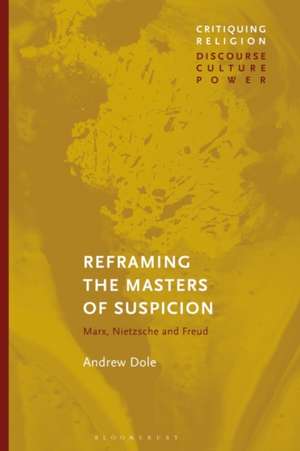Reframing the Masters of Suspicion: Marx, Nietzsche, and Freud: Critiquing Religion: Discourse, Culture, Power
Autor Andrew Doleen Limba Engleză Paperback – 24 iun 2020
Preț: 224.76 lei
Preț vechi: 288.90 lei
-22% Nou
Puncte Express: 337
Preț estimativ în valută:
43.01€ • 44.91$ • 35.51£
43.01€ • 44.91$ • 35.51£
Carte tipărită la comandă
Livrare economică 15-29 aprilie
Preluare comenzi: 021 569.72.76
Specificații
ISBN-13: 9781350170063
ISBN-10: 1350170062
Pagini: 264
Dimensiuni: 156 x 234 x 17 mm
Greutate: 0.37 kg
Editura: Bloomsbury Publishing
Colecția Bloomsbury Academic
Seria Critiquing Religion: Discourse, Culture, Power
Locul publicării:London, United Kingdom
ISBN-10: 1350170062
Pagini: 264
Dimensiuni: 156 x 234 x 17 mm
Greutate: 0.37 kg
Editura: Bloomsbury Publishing
Colecția Bloomsbury Academic
Seria Critiquing Religion: Discourse, Culture, Power
Locul publicării:London, United Kingdom
Caracteristici
Identifies what hermeneutics of suspicion has in common with conspiracy theories, a topic that surfaces with some regularity in academic discussions
Notă biografică
Andrew Dole is a Professor of Religion at Amherst College, USA.
Cuprins
Acknowledgements Introduction 1. Suspicious Explanation, A Primer 2. Classic Suspicion: Marx 3. Classic Suspicion: Nietzsche 4. Classic Suspicion: Freud 5. Conclusion: Paradigms of Suspicion Bibliography Index
Recenzii
Marx, Nietzsche, and Freud have shined a light on the roles of hidden motives, unacknowledged dispositions, and repressed desires in human behavior, and the critical study of religion today would not be possible without their contributions. In this important and jargon-free book, Andrew Dole provides an incisive rereading of the "suspicious explanation" that runs as a common thread running through historical materialism, genealogy, and psychoanalysis. Dole is among the sharpest scholars using philosophical tools to improve the academic study of religions, and his new book offers an original account that will reframe the three masters of suspicion in contemporary terms.
Dole's book provides a theoretical basis for understanding claims about causation and social actors. He unpacks the way that three of the most important social theorists employ suspicion as a way to explain broad social contexts. In doing so, he demonstrates the resonance of their suspicion-based interpretations-their hermeneutics of suspicion-with more contemporary conspiratorial thinking. In providing a genealogy for suspicious interpretations, Dole does a service to scholars researching conspiratorial belief today.
This fascinating study reconsiders the contribution of Karl Marx, Friedrich Nietzsche, and Sigmund Freud to modern intellectual currents by shifting attention from their substantive research fields to their practice of explaining large-scale social and historical phenomena through recourse to hidden agents, resulting in what Andrew Dole terms "suspicious" explanations. This is an original study that forges likes between three distinct fields to create new knowledge.
Conspiracy theories can be seen as a popularised version of critical theory, and Reframing the Masters of Suspicion applies this perspective to some of the foundational figures of the field. Critical theory has much to tell us about conspiracy theories, but this timely book challenges scholars to consider what conspiracy theories might say about our theoretical toolbox.
Dole's book provides a theoretical basis for understanding claims about causation and social actors. He unpacks the way that three of the most important social theorists employ suspicion as a way to explain broad social contexts. In doing so, he demonstrates the resonance of their suspicion-based interpretations-their hermeneutics of suspicion-with more contemporary conspiratorial thinking. In providing a genealogy for suspicious interpretations, Dole does a service to scholars researching conspiratorial belief today.
This fascinating study reconsiders the contribution of Karl Marx, Friedrich Nietzsche, and Sigmund Freud to modern intellectual currents by shifting attention from their substantive research fields to their practice of explaining large-scale social and historical phenomena through recourse to hidden agents, resulting in what Andrew Dole terms "suspicious" explanations. This is an original study that forges likes between three distinct fields to create new knowledge.
Conspiracy theories can be seen as a popularised version of critical theory, and Reframing the Masters of Suspicion applies this perspective to some of the foundational figures of the field. Critical theory has much to tell us about conspiracy theories, but this timely book challenges scholars to consider what conspiracy theories might say about our theoretical toolbox.









